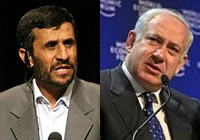A few weeks ago, in discussing how Hezbollah might respond to an Israeli strike on Iran’s nuclear program, I mentioned that both the United States and Hezbollah are more or less held hostage to the drama unfolding between their respective allies. For the United States, part of that dynamic includes the uncertainty it faces concerning whether or not Israel will in fact strike Iran’s nuclear program and, if so, when.
The United States is Israel’s closest ally in the world. The United States has provided Israel an average of $3 billion in grants, almost all of it military aid (.pdf), each year for the past three decades, making Israel by far the largest recipient of U.S. aid since the end of World War II.
Despite all that largesse, the United States has no idea whether or not its close ally will attack Iran -- an action that could have enormous consequences for U.S. interests in the region. Some might argue that this uncertainty represents a diplomatic failure on the part of the United States and that U.S. officials should use U.S. aid to Israel to effect closer policy coordination. For now, though, I want to focus on the intelligence failure that this uncertainty represents.

